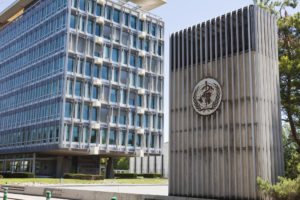
The Congressional Black Caucus introduces the Justice in Policing Act, HHS expands Medicaid and CHIP funding availability during pandemic, and more…
IN THE NEWS
- Led by the U.S. Congressional Black Caucus, the House Judiciary Committee introduced the Justice in Policing Act to increase police accountability, change law enforcement culture, and build trust with communities. Congressional Democrats wrote the bill in response to nationwide protests against police brutality. If passed, the bill would establish national standards for policing—such as banning the use of chokeholds, mandating data collection on police encounters, allocating existing funds to community-based policing initiatives, and making it easier to prosecute police officers for use of excessive force. In support of the legislation, Senator Cory Booker (D-N.J.) stated that the bill marks the end of “a system that time and again refuses to hold police accountable for their brutality.” Republican Senator Mitt Romney (R-Utah), however, reportedly dismissed the bill as “a message piece, as opposed to a real piece of legislation” due to the bill’s lack of Republican sponsors.
- The U.S. Department of Health and Human Services (HHS) announced that it expects to distribute an additional $15 billion to eligible Medicaid and Children’s Health Insurance Program providers that have not yet received funding under the Provider Relief Fund General Allocation, a COVID-19 relief program. HHS will also distribute $10 billion in provider relief funds to safety net hospitals that provide higher rates of uncompensated care and serve the country’s “most vulnerable citizens.” This increased funding will allow HHS to provide relief to the 38 percent of eligible providers who have yet to receive funding.
- President Donald J. Trump signed an executive order imposing economic sanctions and visa restrictions on officials from the International Criminal Court (ICC) who are investigating members of the U.S. military for alleged war crimes in Afghanistan. Press Secretary Kayleigh McEnany said that the Administration is “concerned that adversary nations are manipulating the International Criminal Court by encouraging these allegations against United States personnel.” The U.S. does not legally recognize the ICC’s jurisdiction over war crimes and genocide. However, Andrea Prasow, acting Washington director of Human Rights Watch, said that “the U.S. assault on the ICC is an effort to block victims … from seeing justice,” and “countries that support international justice should oppose this attempt at obstruction.”
- The World Health Organization (WHO) for the first time endorsed the use of face masks to prevent the spread of COVID-19. The new guidelines came months after many countries not only endorsed but required the use of masks in public spaces to reduce the spread of COVID-19. Before issuing these guidelines, WHO had repeatedly recommended refraining from wearing masks unless sick or caring for someone who is sick. WHO’s Director-General Tederos Adhanom Ghebreyesus cited new research that apparently demonstrates the efficacy of masks as barriers preventing virus spread. Michael Osterholm, infectious disease expert at the University of Minnesota, reportedly said that “the WHO has been out of step with most of the world on the issue of droplets and aerosols.”
- Manhattan District Attorney Cyrus Vance announced that the District Attorney’s Office will not prosecute any individuals who were charged with unlawful assembly or disorderly conduct during recent protests over the death of George Floyd. The District Attorney’s Office previously instituted a policy that would have dismissed all such low-level arrests within six months, but it will now decline to prosecute these arrests altogether “in the interest of justice.” Vance’s announcement came a day after a New York state trial court judge denied a Legal Aid Society’s request to release more than 100 protesters who were detained in police custody for over 24 hours. The Legal Aid Society has since appealed the decision.
- Brazilian Supreme Court Justice Alexandre de Moraes ordered Brazilian President Jair Bolsonaro to resume publishing historical data on coronavirus infections and deaths, a practice which Brazil’s Health Ministry recently stopped. Although the Health Ministry previously kept a public record of all confirmed coronavirus infections and deaths to date, the Health Ministry had taken down the website and replaced the comprehensive data with a daily count of infections and deaths dating back only 24 hours. Justice Gilmar Mendes had criticized this reporting change as a manipulation of statistics and “a tactic of totalitarian regimes.”
- Nine members of the Minneapolis City Council announced a commitment to dismantle the city’s police department amid protests following the killing of George Floyd. A supermajority of the city council expressed support defunding the police department and can override a mayoral veto. City Council President Lisa Bender reportedly said that the decision was necessary because “it is clear that our existing system of policing and public safety is not keeping our communities safe” as “our efforts at incremental reform have failed.” Council Member Jeremiah Ellison tweeted that the goal of defunding is to “rethink how we approach public safety and emergency response.”
- U.S. sanctions against the Islamic Republic of Iran Shipping Lines (IRISL) and its Shanghai-based subsidiary E-Sail Shipping Company Ltd. took effect on Monday. Pursuant to President George W. Bush’s Executive Order 13,382, the U.S. Department of State designated IRISL and its subsidiary as proliferators of weapons of mass destruction in December, but postponed the date when the sanctions would take effect to give exporters of humanitarian goods to Iran enough time to find alternative shipping methods. In addition to announcing the U.S. sanctions, Secretary of State Michael Pompeo implored the international community “to investigate all IRISL and E-Sail activity in your ports and territorial seas and take appropriate action to put a halt to it.”
- On behalf of Black Lives Matter Seattle-King County and six protestors who were injured by police, the American Civil Liberties Union of Washington filed a lawsuit against the City of Seattle for authorizing the Seattle Police Department to use “unnecessary violence against peaceful demonstrators,” despite reports of a city-wide pledge not to use tear gas for 30 days. The plaintiffs sought to prevent the continued use of force to calm peaceful protests, including the use of rubber bullets, tear gas, and other chemical irritants. Livio De La Cruz, board member of Black Lives Matter Seattle-King County, reportedly stated that the city needed to focus more on their “policies and systems regarding police practices, use of force, and accountability,” instead of trying to quiet the demonstrations against police brutality.
WHAT WE’RE READING THIS WEEK
- The editorial board of The Wall Street Journal argued that the Trump Administration should respond to China’s recent national security law, which increases restrictions on Hong Kong residents, by offering green cards with a path to citizenship to the people of Hong Kong. Contrary to this suggestion, the Trump Administration responded by announcing a decision to eliminate special exemptions previously afforded to Hong Kong in response to China’s new law. The Journal’s editorial board argued that extending visas to the people of Hong Kong, however, would both deal a blow to China and benefit the United States by attracting Hong Kong’s highly educated and entrepreneurial workforce. The board’s call to offer green cards to Hong Kong’s citizens followed the dramatic announcement by British Prime Minister Boris Johnson that he would offer permanent visas with a path to citizenship to nearly three million people in Hong Kong if Beijing moves forward with its plans to further restrict the city’s autonomy.
- In an op-ed for The Washington Post, Rachel Augustine Potter, assistant professor at the University of Virginia, examined the Trump Administration’s repeal of government regulations during the COVID-19 pandemic. Potter argued that President Trump is using the current crisis as a shield to deregulate with “less scrutiny.” Potter raised concerns that agencies are not receiving important feedback on their proposed rules because experts and industry actors “have been upended” and are not as able to participate fully in the public comment phase of rulemaking. Potter concluded that “hasty deregulation, combined with a lack of oversight caused by the pandemic’s distractions” could lead to poor and rushed policymaking.
- A report for the Brookings Institution by Ingrid Ellen, Paulette Goddard Professor of Urban Policy and Planning at New York University, and several coauthors proposed strategies for addressing the lack of stable, affordable housing highlighted by public health directives in the COVID-19 pandemic. Those living in “poor-quality, overcrowded or unstable housing—or without any home at all—cannot follow public health directives to safely shelter in place” and therefore “are at far greater risk of contracting the virus.” Ellen and her coauthors argue policymakers should focus on increasing “the amount of long term affordable rental housing, especially in high-opportunity communities,” protecting “existing affordable rental housing from physical deterioration and financial insecurity,” and supporting “existing affordable rental housing from physical deterioration and financial insecurity.”
FLASHBACK FRIDAY
- In a 2018 essay for The Regulatory Review, Paul Heaton and John Hollway of the Quattrone Center for the Fair Administration of Justice argued that prosecutors need stronger incentives to prevent wrongful convictions. Although Heaton and Hollway noted that a lack of resources for court-appointed criminal defense attorneys is a critical part of the problem and must also be addressed, they emphasized that absolute immunity from civil damages eliminates any incentives for prosecutors to allocate resources toward preventing erroneous convictions. Citing approvingly the effects that large civil judgments have had on encouraging reforms in the policing context, Heaton and Hollway contended that exposing prosecutors to greater civil liability would likewise serve as an effective deterrent against prosecutorial error.



